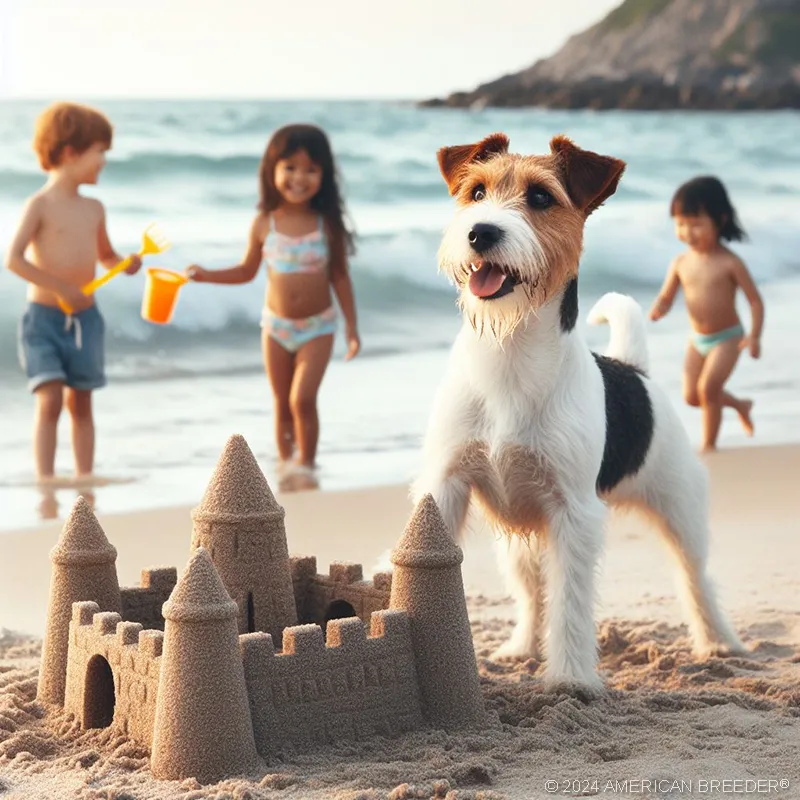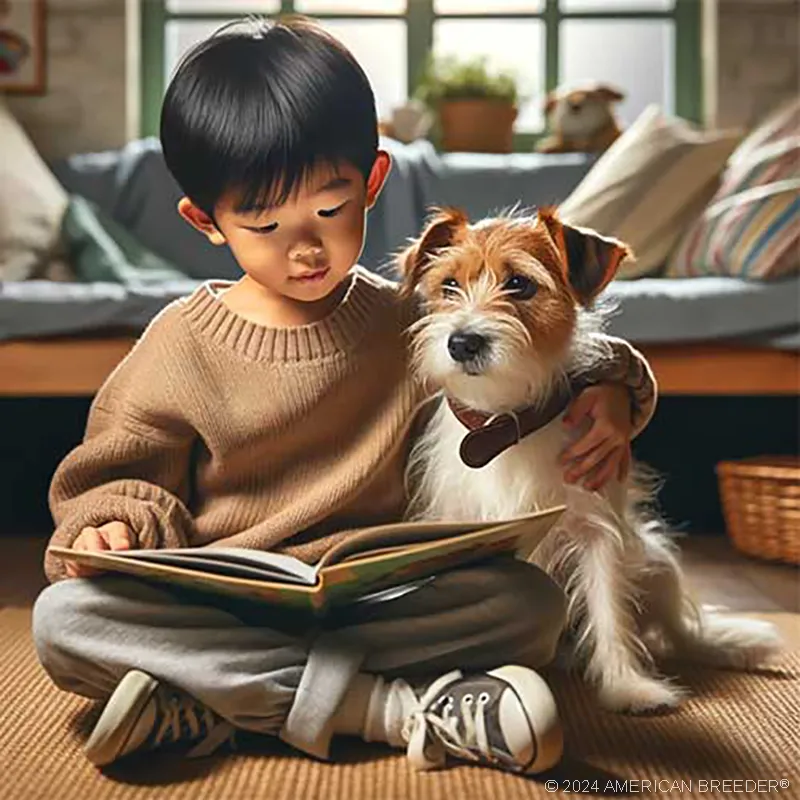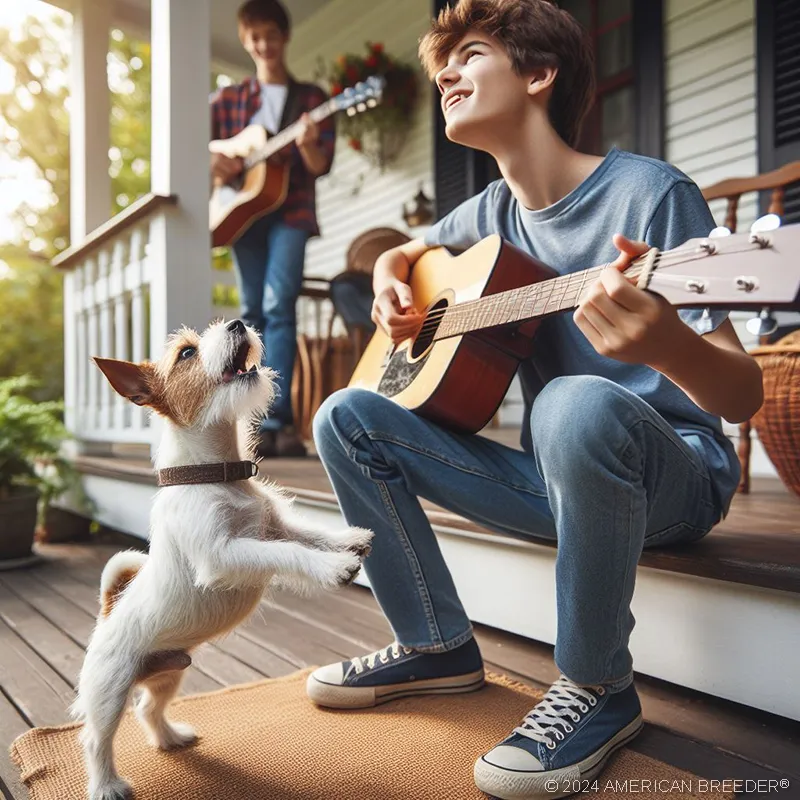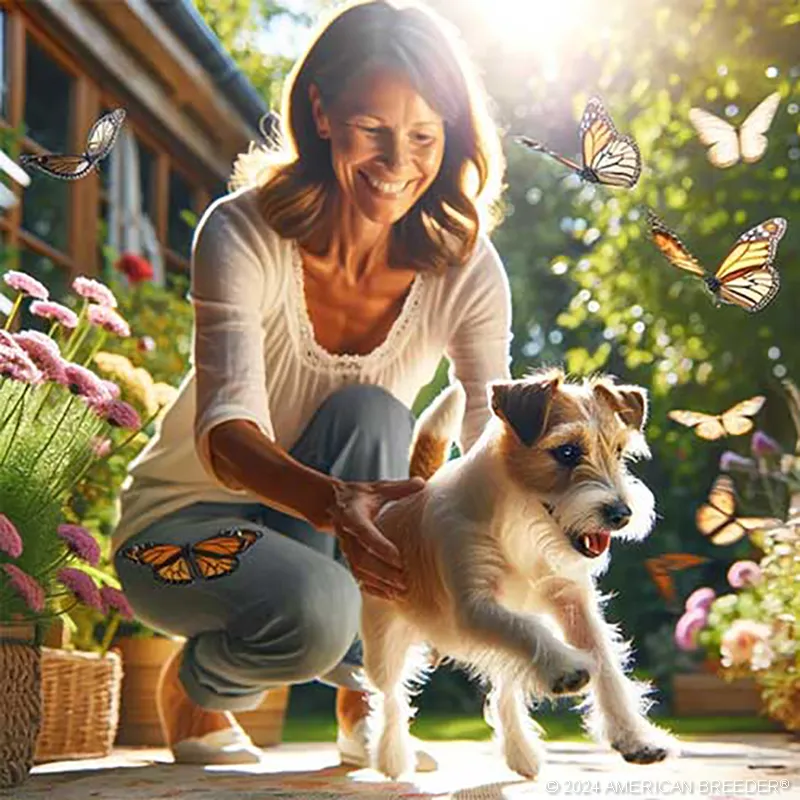Discovering the Parson Russell Terrier: A Complete Guide
Introduction
 Welcome to the definitive guide to the Parson Russell Terrier Dog. Within these pages, you will embark on a comprehensive journey through the world of one of the most spirited and endearing canine companions. From their origins and historical significance to their distinctive characteristics and care requirements, this guide is designed to provide you with an in-depth understanding of the Parson Russell Terrier's captivating world. Whether you're a seasoned dog owner or a curious novice, prepare to be captivated by the wealth of knowledge that awaits you.
Welcome to the definitive guide to the Parson Russell Terrier Dog. Within these pages, you will embark on a comprehensive journey through the world of one of the most spirited and endearing canine companions. From their origins and historical significance to their distinctive characteristics and care requirements, this guide is designed to provide you with an in-depth understanding of the Parson Russell Terrier's captivating world. Whether you're a seasoned dog owner or a curious novice, prepare to be captivated by the wealth of knowledge that awaits you.
Breed Background and History
Origin and Development of the Parson Russell Terrier: The Parson Russell Terrier, a breed born of necessity and bred for tenacity, traces its roots back to 19th century England. Named after the Reverend John "Jack" Russell, a passionate fox hunting enthusiast, these dogs were developed to excel in hunting foxes. Their small stature and fearless nature allowed them to pursue their quarry into tight spaces, showcasing their unwavering dedication and determination.
Historical Significance and Cultural Relevance: Beyond their hunting prowess, Parson Russell Terriers played a role in literature and art, leaving an indelible mark on popular culture. Their appearance in books and paintings immortalized their spunky personalities and distinctive looks, endearing them to generations of enthusiasts. Today, these dogs continue to captivate hearts as beloved companions, showcasing their remarkable adaptability and companionship.
Purpose and Original Use of the Breed: Originally bred for fox hunting, the Parson Russell Terrier's purpose went beyond mere sport. Their keen sense of smell, boundless energy, and strong instincts made them indispensable to huntsmen. Their ability to locate and flush foxes from their dens earned them a reputation as reliable and skilled working dogs. While their hunting roles have diminished, their unwavering spirit and boundless energy make them exceptional family pets and competitors in dog sports.
Kennel Clubs and Recognition: The Parson Russell Terrier's journey from humble beginnings to international recognition is a testament to their enduring appeal. They gained recognition by various kennel clubs, with the American Kennel Club (AKC) officially recognizing them in the Terrier Group. This recognition solidifies their place as a beloved breed that continues to capture hearts around the world.
Appearance
Size, Weight, and Physical Appearance: The Parson Russell Terrier stands as a compact and athletic breed, typically measuring 13 to 14 inches at the shoulder and weighing between 13 to 17 pounds. Their sturdy build and well-proportioned body contribute to their agility and ability to navigate various terrains. Their short coat is weather-resistant, a vestige of their hunting origins.
Coat Type, Color Variations, and Patterns: The breed's coat comes in two types: smooth and broken. The smooth coat is short and dense, providing protection without excessive maintenance. The broken coat combines smooth and rough textures, often with longer hair on the face, eyebrows, and legs. Parson Russell Terriers exhibit a range of colors, including white with black, tan, or lemon markings. These markings add to their distinctive appearance, making each dog unique. Distinctive Features or Markings: One of the Parson Russell Terrier's most recognizable features is their expressive face. Dark, almond-shaped eyes reveal their intelligence and curiosity, while their v-shaped ears add to their alertness. Their tail, traditionally docked for hunting purposes, is often carried high and erect, showcasing their confidence and lively disposition.
Distinctive Features or Markings: One of the Parson Russell Terrier's most recognizable features is their expressive face. Dark, almond-shaped eyes reveal their intelligence and curiosity, while their v-shaped ears add to their alertness. Their tail, traditionally docked for hunting purposes, is often carried high and erect, showcasing their confidence and lively disposition.
Average Litter Size: When it comes to bringing new Parson Russell Terriers into the world, litters typically consist of four to six puppies. This moderate litter size ensures that each pup receives the necessary care and attention during their formative weeks. Their small size and lively nature make them a handful of joy for those fortunate enough to welcome them into their homes.
Temperament and Personality
Typical Temperament Traits and Behavior Tendencies: Parson Russell Terriers are known for their spirited and energetic personalities. Their boundless enthusiasm for life is infectious, and their keen intelligence keeps them engaged in their surroundings. While their hunting background may evoke thoughts of aggression, they are friendly and affectionate with their families, exhibiting loyalty and a strong desire to be involved in every aspect of their owners' lives.
Energy Levels and Activity Requirements: Prepare for an active lifestyle when you welcome a Parson Russell Terrier into your home. Their energy levels are high, and they thrive on engaging activities that challenge their minds and bodies. Regular exercise is crucial to channel their energy constructively and prevent behavioral issues. Walks, playtime, and dog sports provide outlets for their exuberance.
Compatibility with Different Lifestyles and Family Dynamics: The Parson Russell Terrier's adaptability makes them suitable for a variety of lifestyles. Their lively nature is well-suited for families with active children, but they also thrive in homes with singles or couples who can provide ample exercise and mental stimulation. Their eagerness to learn and participate in activities makes them versatile companions for individuals with various interests.
List of Typical Behavior Issues: Understanding and addressing potential behavior issues can enhance your experience as a Parson Russell Terrier owner. While their intelligence and determination are admirable, they can lead to challenges such as aggression, excessive barking, digging behavior, separation anxiety, resource guarding, and fear-based behaviors. Consistent training, positive reinforcement, and proper socialization can help mitigate these challenges.
Trainability and Intelligence
Trainability Level and Ease of Learning: Parson Russell Terriers possess a high level of intelligence that makes them quick learners. They excel in obedience training and dog sports, often mastering commands with enthusiasm. Their intelligence also means they can become independent thinkers, so consistent and positive training methods are essential to keep them engaged and focused. Willingness to Please Their Owner: These eager-to-please dogs are motivated by positive reinforcement and the desire to make their owners proud. They thrive on praise, treats, and play as rewards for a job well done. Building a strong bond through training and positive interactions fosters a sense of cooperation and teamwork between you and your Parson Russell Terrier.
Willingness to Please Their Owner: These eager-to-please dogs are motivated by positive reinforcement and the desire to make their owners proud. They thrive on praise, treats, and play as rewards for a job well done. Building a strong bond through training and positive interactions fosters a sense of cooperation and teamwork between you and your Parson Russell Terrier.
Intelligence and Problem-Solving Abilities: The Parson Russell Terrier's intelligence extends beyond obedience training. They possess problem-solving skills that can amaze and challenge even experienced dog owners. While this can lead to creative solutions, it also means they may find ways to get into mischief. Engaging their minds with puzzles, games, and interactive toys provides an outlet for their mental energy.
Recommended Training Approaches and Techniques: Positive reinforcement training techniques are particularly effective for Parson Russell Terriers. These dogs respond well to rewards such as treats, praise, and playtime. Consistency, patience, and clear communication are key to successful training. Early socialization is also crucial to help them develop well-rounded behavior and interact confidently with various people, animals, and environments.
Training or Skills Best Suited for the Breed: Given their history as hunting dogs, Parson Russell Terriers excel in activities that tap into their natural instincts. Agility, flyball, and earthdog trials are just a few examples of dog sports that harness their energy and enthusiasm. These activities provide mental stimulation and physical exercise while allowing them to showcase their remarkable abilities.
Practical Considerations
Size of Sleeping Quarters Depending: When creating a cozy sleeping space for your Parson Russell Terrier, consider their size and comfort. A soft and appropriately-sized dog bed provides a comfortable retreat where they can rest and recharge. Keep in mind that the bed should be easy to clean, as these active dogs may bring in dirt and debris from their outdoor adventures. Typical Annual Veterinary Cost: Caring for your Parson Russell Terrier's health is a priority, and understanding the financial aspect is crucial. On average, you can expect to spend around $500 to $1,000 per year on routine veterinary care, vaccinations, and preventive medications. It's wise to budget for unexpected medical expenses as well, ensuring that your furry friend receives the best care when needed.
Typical Annual Veterinary Cost: Caring for your Parson Russell Terrier's health is a priority, and understanding the financial aspect is crucial. On average, you can expect to spend around $500 to $1,000 per year on routine veterinary care, vaccinations, and preventive medications. It's wise to budget for unexpected medical expenses as well, ensuring that your furry friend receives the best care when needed.
Type of Grooming and Annual Cost: Grooming your Parson Russell Terrier is relatively straightforward, thanks to their short coats. Regular brushing helps maintain their coat's health and minimizes shedding. Bathing should be done as needed, typically every few months or when they get dirty. As for the cost, grooming expenses vary based on whether you opt for professional grooming or handle grooming tasks at home.
Daily Exercise Needs and Requirements: Satisfying your Parson Russell Terrier's exercise needs is paramount for their well-being. Aim for at least 30 to 60 minutes of vigorous exercise each day. Engage in activities that challenge their physical and mental abilities, such as brisk walks, fetch, and puzzle games. Their high energy levels make them well-suited for families that lead active lifestyles.
Level of Playfulness: Playfulness is a hallmark of the Parson Russell Terrier's personality. They approach life with boundless enthusiasm and are always up for a game of fetch or tug-of-war. Incorporating playtime into their daily routine strengthens the bond between you and your dog while providing an outlet for their energy and exuberance.
Level of Intelligence: Intelligence is a defining trait of the Parson Russell Terrier. Their ability to learn quickly and solve problems can both delight and challenge owners. Engage their minds with interactive toys, training sessions, and brain-teasing games to prevent boredom and encourage mental stimulation. Keeping their minds active is key to a happy and well-behaved companion.
Affection Level and Desired Attention: Parson Russell Terriers thrive on human companionship and attention. Their affectionate nature makes them devoted family members who seek out cuddles and playtime. Meeting their need for social interaction helps prevent behavioral issues that may arise from boredom or loneliness.
Friendliness Toward Strangers: While Parson Russell Terriers are loyal to their families, they can be wary of strangers due to their protective instincts. Proper socialization from a young age helps them develop confidence and approach new people with a positive attitude. Early exposure to different people, places, and experiences builds their social skills and promotes a well-adjusted demeanor. Grooming Needs and Frequency: The grooming needs of Parson Russell Terriers are manageable, thanks to their short coats. Regular brushing, typically once or twice a week, helps minimize shedding and keep their coat looking its best. Bathing should be done as needed, using a mild dog shampoo to maintain their skin's health. Routine tasks such as nail trimming, ear cleaning, and teeth brushing contribute to their overall well-being.
Grooming Needs and Frequency: The grooming needs of Parson Russell Terriers are manageable, thanks to their short coats. Regular brushing, typically once or twice a week, helps minimize shedding and keep their coat looking its best. Bathing should be done as needed, using a mild dog shampoo to maintain their skin's health. Routine tasks such as nail trimming, ear cleaning, and teeth brushing contribute to their overall well-being.
Feeding Requirements and Dietary Considerations: A balanced diet is essential to your Parson Russell Terrier's health and vitality. High-quality commercial dog food that matches their age, size, and activity level is a good starting point. Portion control is crucial to prevent obesity, a common concern in small breeds. Consult your veterinarian for personalized dietary recommendations and monitor their weight to ensure they maintain a healthy body condition.
Portion Sizes: Feeding the right portion sizes is crucial to prevent overeating and maintain your Parson Russell Terrier's optimal weight. Generally, adult dogs require about 1/4 to 1/2 cup of high-quality dry dog food per meal, divided into two meals a day. Puppies and active dogs may need slightly larger portions, but it's important to monitor their weight and adjust portion sizes as needed.
Feeding Schedule: Establishing a regular feeding schedule provides structure for your Parson Russell Terrier's daily routine. Divide their daily portion into two meals to help prevent digestive issues and regulate their energy levels. Consistency is key, as dogs thrive on routine. Stick to the same feeding times and avoid free-feeding to maintain healthy eating habits.
Recommended Dog Food Brands/Types: Choosing the right dog food is crucial for your Parson Russell Terrier's overall health. Look for high-quality dog food brands that list meat as the primary ingredient and avoid fillers or artificial additives. Opt for formulations that cater to small breed dogs' nutritional needs and provide a balanced combination of protein, carbohydrates, fats, vitamins, and minerals.
Treats and Dietary Restrictions: Treats are a great way to reinforce positive behavior and bond with your Parson Russell Terrier. However, moderation is key to prevent excessive calorie intake. Choose small, nutritious treats specifically designed for small breed dogs. Be mindful of their dietary restrictions, if any, and avoid feeding them human foods that can be harmful, such as chocolate, grapes, and onions.
Health and Care
Common Health Issues or Predispositions: Like all breeds, Parson Russell Terriers may be prone to certain health issues. Some of the common concerns include patellar luxation, where the knee joint slips out of place; lens luxation, a condition affecting the eye's lens; and deafness, which can be congenital or develop later in life. Additionally, dermatitis and skin allergies can be triggered by environmental factors or food sensitivities. Regular veterinary check-ups, a nutritious diet, and proper grooming practices can help mitigate these concerns and ensure your dog's well-being. Allergies and Specific Dietary Considerations: Parson Russell Terriers can be sensitive to certain allergens, including pollen, dust, and certain food ingredients. If you notice symptoms such as itching, redness, or gastrointestinal upset, consult your veterinarian to determine the cause. They may recommend dietary changes, hypoallergenic foods, or allergy testing to identify and manage allergens that affect your dog.
Allergies and Specific Dietary Considerations: Parson Russell Terriers can be sensitive to certain allergens, including pollen, dust, and certain food ingredients. If you notice symptoms such as itching, redness, or gastrointestinal upset, consult your veterinarian to determine the cause. They may recommend dietary changes, hypoallergenic foods, or allergy testing to identify and manage allergens that affect your dog.
Lifespan and Longevity Expectations: Parson Russell Terriers have a lifespan of around 13 to 15 years when provided with proper care and a healthy lifestyle. Genetics, diet, exercise, and preventive healthcare all play a role in determining their longevity. Regular exercise, a balanced diet, routine veterinary check-ups, and attention to their mental and emotional well-being contribute to a longer and happier life.
Grooming Requirements Based on Coat Type and Size: Grooming your Parson Russell Terrier is a straightforward task that varies depending on their coat type. Smooth-coated Parson Russells require minimal grooming, with occasional brushing to remove loose hair and dirt. Broken-coated Parson Russells benefit from more frequent brushing to prevent matting and reduce shedding. Regular ear cleaning, nail trimming, and dental care complete their grooming routine.
Exercise Needs and Recommendations for Physical and Mental Stimulation: Meeting your Parson Russell Terrier's exercise needs is essential for their physical and mental well-being. Engage in daily activities that challenge their agility and intellect, such as brisk walks, fetch, and interactive puzzle games. Dog sports like agility and obedience training are excellent outlets for their energy, keeping them happy, healthy, and mentally sharp.
Nutrition and Feeding Guidelines: Providing a balanced and nutritious diet is crucial to your Parson Russell Terrier's overall health. High-quality commercial dog food that matches their age, size, and activity level is a good starting point. Pay attention to portion sizes and avoid overfeeding to prevent obesity. Consult with your veterinarian to tailor their diet to their individual needs and monitor their weight regularly.
Vaccination Schedule and Preventive Care: Following a vaccination schedule and preventive care routine is vital to safeguard your Parson Russell Terrier's health. Core vaccines, including rabies, distemper, and parvovirus, are essential to protect against common and potentially life-threatening diseases. Non-core vaccines, such as those for kennel cough or Lyme disease, can be recommended based on your dog's lifestyle and risks.
Regular Health Check-ups and Vet Visits: Regular veterinary check-ups are essential for early detection and prevention of health issues. Annual examinations allow your veterinarian to assess your Parson Russell Terrier's overall health, discuss any concerns, and recommend appropriate screenings or tests. Dental health, parasite prevention, and weight management are also discussed during these visits.
Signs of Potential Health Problems and When to Seek Veterinary Attention: Familiarizing yourself with signs of potential health problems empowers you to act promptly. Watch for symptoms like changes in appetite, lethargy, vomiting, diarrhea, or unusual behaviors. If you notice any concerning signs, consult your veterinarian for a proper diagnosis and treatment plan. Regular monitoring and open communication with your vet contribute to your dog's well-being.
Socialization and Compatibility
Interaction with Children, Other Pets, and Strangers: Parson Russell Terriers are known for their affectionate and sociable nature. They usually get along well with children and enjoy interactive play. Proper socialization from an early age ensures they interact positively with other pets and strangers. Teaching children how to interact safely and respectfully with dogs fosters a harmonious relationship and prevents potential issues. Socialization Needs and Tips for Proper Socialization: Socialization is a crucial aspect of raising a well-adjusted Parson Russell Terrier. Early exposure to various people, animals, environments, and situations helps them develop confidence and reduces the likelihood of fear-based behaviors. Positive experiences during the critical socialization period contribute to their adaptability and ease in new situations.
Socialization Needs and Tips for Proper Socialization: Socialization is a crucial aspect of raising a well-adjusted Parson Russell Terrier. Early exposure to various people, animals, environments, and situations helps them develop confidence and reduces the likelihood of fear-based behaviors. Positive experiences during the critical socialization period contribute to their adaptability and ease in new situations.
Precautions or Considerations for Multi-Dog Households: Introducing a new Parson Russell Terrier to a multi-dog household requires careful consideration and patience. Proper introductions, gradual integration, and supervision are key to ensuring a smooth transition. Each dog's unique personality should be taken into account, and ensuring they have their own space and resources prevents potential conflicts.
Level of Ease When It Comes to Training: Parson Russell Terriers' intelligence and willingness to please make them generally responsive to training. Their enthusiasm for learning new commands and tricks makes training an enjoyable experience for both dog and owner. Consistent, positive reinforcement-based methods enhance their responsiveness and encourage a cooperative attitude.
Playtime and Exercise with Other Dogs or Pets: Parson Russell Terriers usually enjoy playtime and exercise with other dogs and pets. Their high energy levels and playful demeanor make them compatible with similar-sized and well-matched playmates. Supervision during play ensures safety and prevents any unintentional roughness. Engaging in group activities like dog park visits and playdates enriches their social lives.
Dog-Friendly Activities and Outings: Engaging your Parson Russell Terrier in dog-friendly activities and outings enhances their quality of life. Exploring nature trails, visiting dog parks, and participating in dog sports allow them to channel their energy constructively while bonding with you. These shared experiences create lasting memories and strengthen your companionship.
Living Arrangements and Environment
Suitability for Different Living Arrangements: Parson Russell Terriers' adaptability makes them suitable for various living arrangements. They thrive in apartments or houses with yards, provided they receive ample exercise and mental stimulation. Urban and rural environments both offer opportunities for them to explore and engage in activities that cater to their energetic nature.
Space Requirements and Exercise Options: While Parson Russell Terriers can adapt to apartment living, they require regular exercise to stay happy and healthy. A yard provides them with space to run and play, but daily walks, play sessions, and interactive games are essential regardless of your living situation. Engaging them in activities that challenge their agility and intelligence prevents boredom and behavioral issues. Climate Considerations and Adaptability: Parson Russell Terriers' short coat and compact size contribute to their adaptability to various climates. However, they are sensitive to extreme cold and heat. During hot weather, provide shaded areas and access to water to prevent overheating. In cold weather, consider using dog sweaters or coats to keep them warm during outdoor activities.
Climate Considerations and Adaptability: Parson Russell Terriers' short coat and compact size contribute to their adaptability to various climates. However, they are sensitive to extreme cold and heat. During hot weather, provide shaded areas and access to water to prevent overheating. In cold weather, consider using dog sweaters or coats to keep them warm during outdoor activities.
Recommended Yard Size for Parson Russell Terrier: While Parson Russell Terriers can adapt to different yard sizes, a yard with sufficient space for them to run and play is ideal. A securely fenced yard allows them to explore freely while staying safe. A yard size of at least 500 to 700 square feet provides enough room for them to engage in activities that satisfy their exercise needs. Regular playtime and interactive games in the yard contribute to their physical and mental well-being.
Indoor Living Arrangements and Crating: Indoor living arrangements should prioritize your Parson Russell Terrier's comfort and safety. Providing them with a cozy dog bed or crate allows them to have a designated resting place where they feel secure. Crate training can be a valuable tool for housetraining and offering a safe haven when needed, but it should always be associated with positive experiences.
Travel and Outdoor Adventures: Parson Russell Terriers are adventurous souls who enjoy traveling and outdoor activities. Their portable size makes them great travel companions for road trips and outdoor excursions. Whether hiking, camping, or visiting dog-friendly destinations, they relish the opportunity to explore new environments and engage in bonding experiences with their human family members.
Creating a Dog-Friendly Living Environment: Designing a dog-friendly living environment contributes to your Parson Russell Terrier's well-being. Provide a variety of toys that stimulate their minds and keep them entertained. Set up designated spaces for play, relaxation, and sleeping to create structure in their daily routine. Ensuring their living space is safe and free from hazards enhances their comfort and happiness.
Training and Behavioral Guidance
 Training Techniques and Positive Reinforcement: Training your Parson Russell Terrier involves using positive reinforcement techniques that reward good behavior. They respond well to praise, treats, and play as rewards for following commands. Consistency, patience, and clear communication are key to successful training. Focus on building a strong bond and establishing yourself as a fair and confident leader.
Training Techniques and Positive Reinforcement: Training your Parson Russell Terrier involves using positive reinforcement techniques that reward good behavior. They respond well to praise, treats, and play as rewards for following commands. Consistency, patience, and clear communication are key to successful training. Focus on building a strong bond and establishing yourself as a fair and confident leader.
Addressing Potential Behavior Issues: Being aware of potential behavior issues helps you address them proactively. Parson Russell Terriers' intelligence and energy can lead to challenges like barking, digging, and separation anxiety. A structured routine, mental stimulation, and physical exercise are essential for preventing or managing these behaviors. Seeking professional guidance from a dog trainer or behaviorist can offer effective strategies.
Socialization and Handling Skills: Socialization is a critical aspect of training for Parson Russell Terriers. Exposing them to various people, animals, environments, and experiences during their puppyhood helps them become confident and well-mannered adults. Positive interactions with different situations build their resilience and ability to adapt to changing circumstances.
Training Goals and Consistency: Establish clear training goals to guide your Parson Russell Terrier's education. Whether teaching basic commands, advanced tricks, or appropriate behavior around guests, setting achievable goals ensures a sense of accomplishment for both you and your dog. Consistency in your training approach and expectations helps your dog understand what is expected of them.
Positive Leadership and Bond Building: Building a positive and respectful relationship with your Parson Russell Terrier is foundational to effective training. Positive leadership involves setting clear boundaries and rules while rewarding desired behaviors. Creating a sense of trust and cooperation fosters a strong bond that encourages your dog to look to you for guidance and reassurance.
Beyond Basics: Advanced Training and Activities
 Advanced Training Skills and Activities: As your Parson Russell Terrier masters basic commands, you can explore advanced training skills and activities to further challenge their intellect and enhance their abilities. Teaching complex tricks, participating in agility courses, and engaging in canine sports like flyball or obedience trials provide opportunities for them to shine and showcase their intelligence.
Advanced Training Skills and Activities: As your Parson Russell Terrier masters basic commands, you can explore advanced training skills and activities to further challenge their intellect and enhance their abilities. Teaching complex tricks, participating in agility courses, and engaging in canine sports like flyball or obedience trials provide opportunities for them to shine and showcase their intelligence.
Participation in Dog Sports: Parson Russell Terriers excel in various dog sports due to their agility, intelligence, and enthusiasm. Agility competitions allow them to navigate obstacle courses with speed and precision. Flyball tests their speed and teamwork, while earthdog trials tap into their hunting instincts. Engaging in these activities fulfills their need for mental and physical stimulation.
Canine Freestyle and Trick Training: Canine freestyle, also known as dog dancing, combines obedience, tricks, and choreography to create captivating performances. Teaching your Parson Russell Terrier a repertoire of tricks and maneuvers enhances their mental flexibility and coordination. It also strengthens the bond between you and your dog as you work together to create unique routines.
Therapy Dog Work and Community Service: The affectionate and friendly nature of Parson Russell Terriers makes them excellent candidates for therapy dog work. Training them to provide comfort and companionship to people in hospitals, nursing homes, or schools can make a positive impact in the community. Certification programs and training ensure they are well-prepared for these valuable roles.
Maintaining Mental Stimulation: Parson Russell Terriers thrive on mental stimulation, and advanced training and activities provide an avenue to challenge their minds. Engaging in new experiences, learning complex tasks, and solving puzzles keep them intellectually engaged. Regularly introducing novel activities prevents boredom and supports their cognitive health.
Parson Russell Terrier as a Family Pet
Family-Friendly Characteristics: Parson Russell Terriers' lively and affectionate nature makes them ideal family pets. They enjoy being part of the action and engaging in activities with family members of all ages. Their adaptable and sociable personalities help them bond with children, parents, and grandparents, creating a harmonious and inclusive family dynamic.
Child Interaction and Supervision: Parson Russell Terriers generally get along well with children due to their playful and patient nature. However, interactions should always be supervised to ensure both the dog and child's safety. Teaching children how to approach and handle dogs respectfully helps prevent accidental injuries and fosters a positive relationship. Role in Teaching Responsibility: Welcoming a Parson Russell Terrier into your family provides an opportunity to teach children about responsibility, empathy, and caring for a living being. Assigning age-appropriate tasks such as feeding, grooming, and playtime fosters a sense of ownership and teaches valuable life lessons about empathy, communication, and teamwork.
Role in Teaching Responsibility: Welcoming a Parson Russell Terrier into your family provides an opportunity to teach children about responsibility, empathy, and caring for a living being. Assigning age-appropriate tasks such as feeding, grooming, and playtime fosters a sense of ownership and teaches valuable life lessons about empathy, communication, and teamwork.
Bonding and Companionship: The strong bond between Parson Russell Terriers and their families is a source of companionship and emotional support. They are always eager to participate in family activities, from playing fetch in the yard to snuggling on the couch. Their loyalty and unwavering affection contribute to a sense of unity and warmth in the household.
Inclusion in Family Activities: Parson Russell Terriers thrive on inclusion and enjoy being part of family activities. Whether it's a family hike, picnic, or game night, they eagerly participate and contribute to the fun. Including your dog in your daily routine strengthens your bond and adds an element of joy to shared experiences.
Conclusion
In concluding this comprehensive guide to the Parson Russell Terrier, we've explored every facet of this remarkable breed's attributes, history, care, and significance. From their origins as tenacious hunting dogs to their roles as cherished family companions, Parson Russell Terriers embody a spirit of adventure, loyalty, and endless enthusiasm.
As you embark on your journey with your own Parson Russell Terrier, armed with knowledge and insights, you'll build a bond that enriches both your lives. Cherish the moments of playfulness, the shared adventures, and the unwavering loyalty that this breed brings to your world.
Parson Russell Terrier Dog Quick Reference Guide
 Breed Background: Origin: England | Breed Purpose: Fox hunting | AKC Class: Terrier Group | Year Recognized by AKC: 1997
Breed Background: Origin: England | Breed Purpose: Fox hunting | AKC Class: Terrier Group | Year Recognized by AKC: 1997
Appearance: Size: Small-Medium (13-14 inches) | Weight: 13-17 pounds | Coat Type: Rough, wiry | Colors & Patterns: Various color combinations | Distinctive Features: Athletic build, upright tail
Temperament: Energy Level: 4/5 | Friendliness to Pets: 3/5 | Friendliness to Strangers: 3/5 | Trainability: 3/5 | Playfulness: 4/5 | Frequent Barker: 3/5 | Chase Instincts: 5/5 | Sense of Smell: 4/5 | Drive to Hunt: 5/5
Health & Care: Health Issues: Patellar luxation, deafness, eye conditions | Lifespan: 13-15 years | Grooming Difficulty: Moderate | Exercise Needs: High
Socialization: Interaction with Children: Good with supervision | Interaction with Pets: Can be selective | Interaction with Strangers: Cautious | Ease of Training: Moderate
Suitable Living Arrangements: Apartment: No | House: Yes | Rural Area: Yes | Yard Size Requirements: Medium to Large
Training & Obedience: Trainability: 3/5 | Intelligence: 4/5 | Obedience: 3/5 | Problem-Solving: 4/5 | Easily Stimulated: 4/5 | Focus Level: 3/5 | Easily Distracted: 4/5
Financial Planning: Typical Price Range: $500 - $1500 | Initial Expenses: Puppy essentials, training | Ongoing Annual Expenses: Food, medical care
Breeding: Reproductive Maturity: 6-9 months | Litter Frequency: 1-2 litters per year | Litter Size: 4-8 puppies | Stud Cost: Varies | Breeding Challenges: Selecting suitable mates
